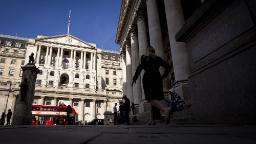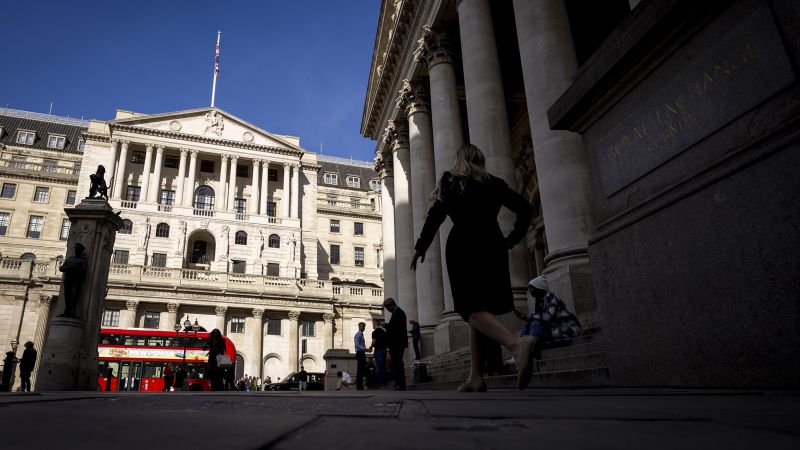
London
CNN Business
—
The Bank of England is struggling to contain a crisis triggered by the UK government’s brash plans to borrow heavily to pay for tax cuts, feeding fears that the country’s financial markets could once again spin out of control.
Almost 20 days after Finance Minister Kwasi Kwarteng unveiled his much-criticized plan to jumpstart the economy, sparking an investor revolt, the UK bond market and the British pound remain under huge stress — despite three emergency interventions by the central bank.
Yields on benchmark 10-year UK government bonds climbed above 4.59% on Wednesday, near where they were in the immediate aftermath of Kwarteng’s announcement last month. The yield on 30-year bonds also rocketed above 5%. Yields rise as bond prices fall, pushing up the cost of borrowing for the government, mortgage holders and businesses.
The country’s central bank is in a difficult position. It’s trying to restore the UK government’s lost credibility in markets, though its toolkit isn’t designed for this kind of effort.
“They can’t do anything to address the root of the problem, which is confidence in UK assets,” said Richard McGuire, head of rates strategy at Rabobank.
Yet after extra support for markets announced this week fell flat, the Bank of England faces calls to do more to help avert another meltdown. The focus is now on whether it should extend the £65 billion ($72 billion) bond-buying program that it announced in late September beyond its Friday end date.
Pension funds that were hit hard by the UK bond market rout two weeks ago say they may need more time to get their affairs in order, and questions about the government’s plans to manage its debts — a key cause of the tumult — won’t be answered until at least the end of October, when Kwarteng will release additional details on his tax-and-spending plan.
“The only solution for the Bank of England now is to extend [bond-buying] a bit longer and to make it bigger,” said Bryn Jones, head of fixed income for Rathbones. “The market’s turned around and said, “We need you to do more.’”
Bank of England Governor Andrew Bailey isn’t budging, for now at least. “You’ve got three days left now,” he told pension fund managers on Tuesday, emphasizing that the program is temporary. “You’ve got to get this done.”
The Bank of England said it was forced to act to prevent a “self-reinforcing spiral” after the market experienced unprecedented selling in the wake of the budget plans revealed by Kwarteng and Prime Minister Liz Truss.
As the price of government bonds crashed, some pension funds were asked to pony up billions of pounds in collateral. In a scramble for cash, investment managers were forced to sell whatever they could — including, in some cases, more government bonds. That sent yields even higher, sparking another wave of collateral calls.
The central bank’s announcement on Sept. 28 that it would buy bonds through Oct. 14 initially calmed the chaos. Yet market conditions have started to deteriorate again in recent days as pension funds sell what they can to refill their coffers before the program ends.
“There is a fair degree of urgent activity in the industry at the moment,” said Steve Delo, chairman of PAN Trustees, which provides governance services to UK pension programs. “Investment consultants are working feverishly.”
Ongoing volatility in the bond market is further complicating those efforts, as rising yields once again put hedging strategies at risk.
“You’re having to deal with something of a moving target, and that’s probably the essence of the challenge,” Delo said.
So far, the Bank of England has purchased just £8.8 billion ($9.8 billion) in bonds, well below what it could have scooped up.
But it has been resolute that it will stick with Friday’s deadline, emphasizing that it doesn’t want to intervene for any longer than is necessary.
“As the bank has made clear from the outset, its temporary and targeted purchases of gilts will end on 14 October,” a spokesperson said on Wednesday.
Yet as bond yields keep rallying, not everyone is convinced that approach makes sense. The Pensions and Lifetime Savings Association said the end date was a “key concern” for its members, who provide retirement incomes for 30 million people. Investors, meanwhile, haven’t been sold on the actions taken thus far.
“The BoE seems intent on showing the measures they are taking are financial tools, not a form of monetary policy,” Daniela Russell, head of UK rates strategy at HSBC, said in a recent note to clients. “In doing so, however, we think they may prove to be insufficient and fail to achieve their aim.”
The central conundrum is that the bank is caught in a web of contradictory policy aims. The UK government has said it wants to boost demand to stimulate growth, while the central bank wants to reduce demand in order to bring down painfully high inflation — creating confusion about which goal will win out.
Recent policy reversals by the beaten-down Truss government, including the scrapping of a tax cut for top earners, have also made it hard for investors to discern what measures are still in play.
“The more U-turns you make, the more there’s a question mark over the durability of any policy,” said Rabobank’s McGuire, who described the market situation in the United Kingdom as a “slow-moving car crash.”
Plus, the Bank of England plans to start selling government bonds bought during the pandemic at the end of the month to help tackle inflation. If it were to buy bonds at the same time to keep markets stable, its message could become even more muddled.
Russell said the situation remains “precarious,” but she thinks the Bank of England can kick off bond sales as planned, provided it focuses on shorter-dated debt, which hasn’t been hammered as badly.
Such complex proposals drive home just how horrible a position the Bank of England is in. Its past interventions haven’t worked. The government is making its life much harder. And inflation, as ever, continues to loom.
It’s a warning to governments around the world about the cost of any missteps at a delicate moment, with interest rates rising at the fastest clip in decades and financial markets showing signs of strain.
What’s happening in the United Kingdom is a “cautionary, salutary tale,” McGuire said.
Note:- (Not all news on the site expresses the point of view of the site, but we transmit this news automatically and translate it through programmatic technology on the site and not from a human editor. The content is auto-generated from a syndicated feed.))



